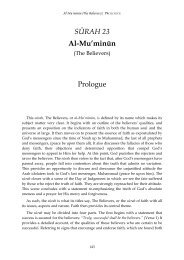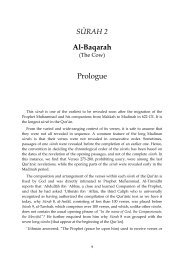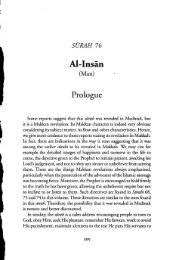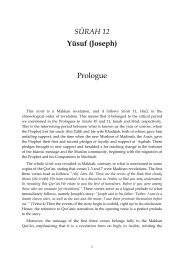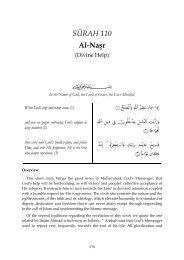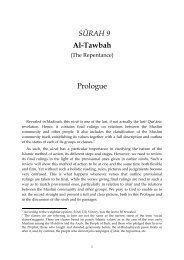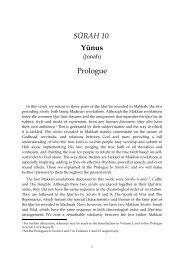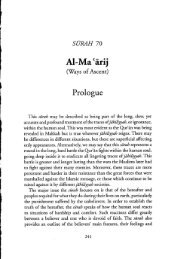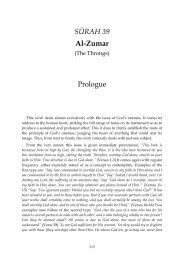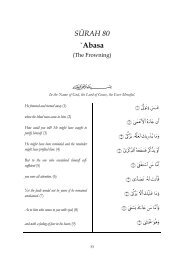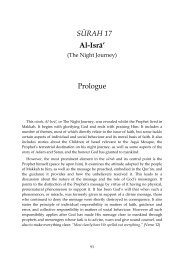31) Luqman - TAFSIR FI ZILAL AL-QURAN
31) Luqman - TAFSIR FI ZILAL AL-QURAN
31) Luqman - TAFSIR FI ZILAL AL-QURAN
You also want an ePaper? Increase the reach of your titles
YUMPU automatically turns print PDFs into web optimized ePapers that Google loves.
Luqmān | PROLOGUE<br />
faith, including the all-important duty of enjoining what is right and forbidding what<br />
is wrong, and what follows from both of remaining patient in adversity, as<br />
difficulties are bound to be encountered by the advocates of faith: “Endure with<br />
fortitude whatever befalls you. These are matters that require strong resolve.” (Verse 17)<br />
This should be coupled with commitment to good manners. No advocate of faith<br />
should ever be arrogant, as such action is bound to spoil his advocacy efforts: “Do not<br />
turn your cheek away from people in false pride, nor walk haughtily on earth. God does not<br />
love anyone who is arrogant, boastful. Be of modest bearing in your walk, and lower your<br />
voice; for the most hideous of voices is the braying of the ass.” (Verses 1819) Not only does<br />
the sūrah dismiss such proud, haughty and arrogant behaviour, it looks upon it with<br />
contempt. This provides a marked psychological effect.<br />
The third presentation begins with a new factor derived from people’s attachment<br />
to the heavens and the earth, and the blessings God has placed in them for mankind,<br />
even though they do not show any gratitude: “Are you not aware that God has made<br />
subservient to you all that is in the heavens and the earth, and has lavished upon you His<br />
blessings, outward and inward? Yet some people argue about God without having any<br />
knowledge, without guidance, and without any light-giving revelations.” (Verse 20) This<br />
new factor shows all argument about God to be abhorrent to an upright nature and<br />
sound mind. The sūrah denounces the unbelievers’ stagnant attitude: “When it is said<br />
to them: ‘Follow what God has revealed’, they say, No; but we will follow only what we found<br />
our forefathers believing in.” (Verse 21) This is a stupid attitude betraying total<br />
ignorance. The comment that follows also carries a strong psychological component:<br />
“Why, even if Satan is beckoning them to the suffering of the blazing fire.” (Verse 21)<br />
The question of reward and requital on the Day of Judgement is then shown to be<br />
closely connected with the question of belief or denying faith: “Whoever submits<br />
himself to God and excels in good deeds has indeed taken hold of a most firm support. With<br />
God rests the final outcome of all events. And whoever disbelieves; let not their unbelief grieve<br />
you. To Us they must all return, and then We shall inform them about all that they were<br />
doing [in life].” (Verses 22-23) The sūrah then refers to God’s absolute knowledge:<br />
“God has full knowledge of what is in people’s hearts.” (Verse 23) A strong element of<br />
warning is then added: “We will let them enjoy themselves for a short while, but We shall<br />
ultimately drive them into severe suffering.” (Verse 24)<br />
As this third presentation draws to a close people are made to face up to the logic<br />
of human nature as it reflects different aspects of the universe and its inevitable<br />
acknowledgement of the One Creator: “If you were to ask them: ‘Who is it that has<br />
created the heavens and the earth?’ they will be sure to answer: ‘God’ Say: All praise is due to<br />
God alone!’ Yet most of them do not understand.” (Verse 25) The section then concludes<br />
with a scene of the universe, showing God’s knowledge as infinite, while His will of<br />
creation and origination is unrestricted. These are given as universal evidences in<br />
<strong>31</strong>9



